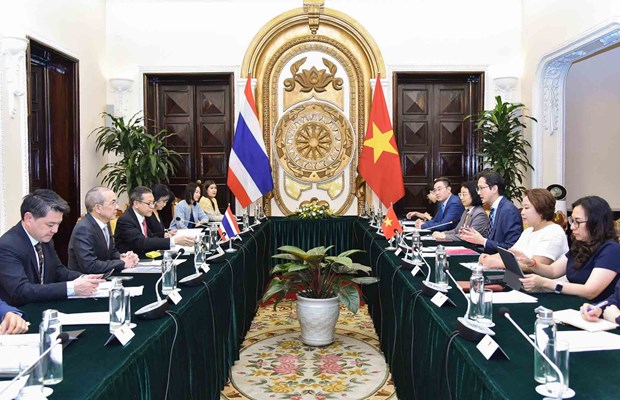 The ninth political consultation between Vietnam and Thailand in Hanoi on June 13 (Photo: VNA)
The ninth political consultation between Vietnam and Thailand in Hanoi on June 13 (Photo: VNA)Hanoi (VNA) –
Vietnamese Deputy Minister of Foreign Affairs Do Hung Viet and Permanent
Secretary for Foreign Affairs of Thailand Sarun Charoensuwan co-chaired the
ninth political consultation between the two countries in Hanoi on June 13.
The two sides shared
the view that cooperation in politics – diplomacy, security, and defence
remains one of the important pillars of the Vietnam – Thailand relations. They reaffirmed
the commitment to not allowing any individual or organisation to use the
territory of one country to harm the other.
cooperation between the two foreign ministries’ relevant units, work closely to
promote the fruitful implementation of the action plan for carrying out the
countries’ enhanced strategic partnership 2022 – 2027, and step up the signing
of important documents in different spheres, thereby further intensifying the enhanced
strategic partnership.
The two officials
highly valued the vigorous growth of economic, trade, and investment ties while
agreeing on coordination to promote the fruitful implementation of their
countries’ “three connections” strategy (connecting supply chains; connecting
economic sectors, businesses, and localities; and connecting green and sustainable
growth strategies) so that bilateral trade can reach the target of 25 billion
USD in the near future.
Viet said both sides should make full use of bilateral cooperation mechanisms to discuss concrete
measures for tackling difficulties, creating favourable conditions, and further
opening their markets to each other’s goods.
He asked Thailand
to consider minimising the imposition of trade barriers to help reduce trade
deficit for Vietnam; increase investment in the fields matching the two sides’
strength and potential such as tourism, renewable energy, food processing,
smart agriculture, and infrastructure building; and expand cooperation to new
areas like digital economy, green economy, and high technology.
At the event, Vietnam
and Thailand also agreed on the need to further reinforce ties in other important areas, including agriculture, transport, maritime cooperation, tourism,
culture, education, people-to-people exchange, and locality-to-locality collaboration.
Charoensuwan affirmed
that Vietnam is an important strategic partner of Thailand in the region, and
that Thailand’s consistent foreign policy is to further strengthen bilateral
cooperation in all aspects.
He concurred that the
two sides should consider limiting the imposition of trade barriers to each
other’s goods.
Most leading enterprises
of Thailand are operating effectively in Vietnam, and many plan to expand investment
and hope for more optimal conditions provided by the Vietnamese Government, he
noted.
The Permanent
Secretary also spoke highly of the role of and contributions by the Vietnamese
community in his country to local socio-economic development, describing them
as an important bridge helping foster mutual understanding and relations
between the countries.
The two officials also
exchanged views on international and regional issues of common concern.
They perceived that
the enhancement of mutual trust and the enhanced strategic partnership
both bilaterally and in international and regional mechanisms,
especially the United Nations, the Association of Southeast Asian Nations (ASEAN),
and the Mekong sub-regional cooperation, will help the two countries respond to
challenges more effectively, work towards sustainable development, and
contribute to regional peace and stability.
They underlined their
countries’ wish to turn the East Sea into a sea of peace, stability,
cooperation, and development and join other ASEAN countries in seriously and fully
implementing the Declaration on the Conduct of Parties in the East Sea (DOC)
and soon finalising an efficient and effective code of conduct (COC) that is in
accordance with international law and the 1982 UN Convention on the Law of the
Sea (UNCLOS)./.


